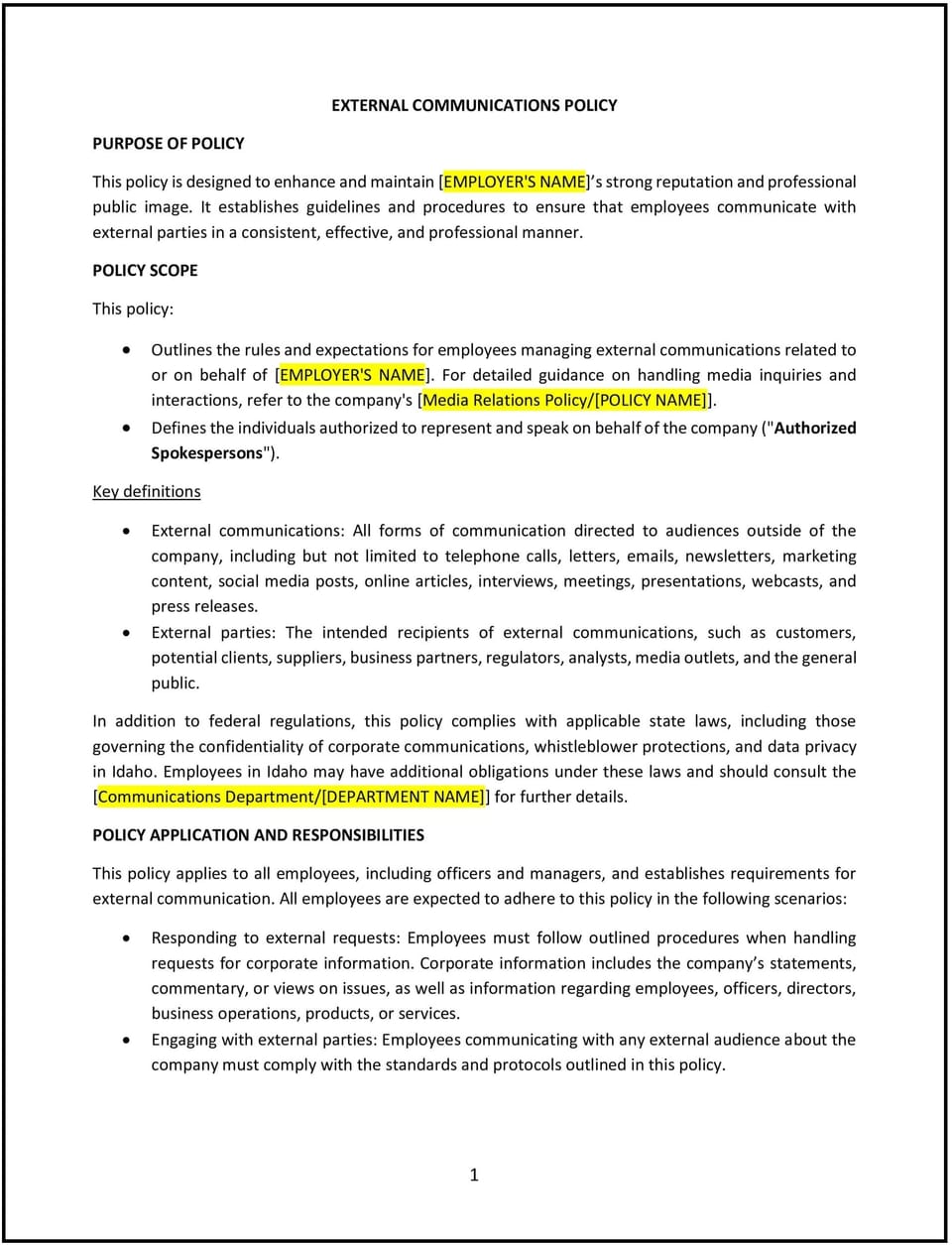External communications policy (Idaho): Free template

External communications policy (Idaho)
An external communications policy helps Idaho businesses establish guidelines for managing interactions with external stakeholders, such as customers, media, partners, and the public. This policy outlines the standards for representing the business, sharing information, and maintaining consistency in messaging. It reflects the business’s commitment to professionalism, transparency, and protecting its reputation.
By implementing this policy, businesses can ensure clear, accurate, and consistent communication while minimizing risks associated with misinformation or unauthorized disclosures.
How to use this external communications policy (Idaho)
- Define scope: Specify the types of external communications covered by the policy, such as press releases, social media posts, customer interactions, or partner communications.
- Assign responsibilities: Designate roles and responsibilities for managing external communications, such as a communications team or spokesperson.
- Establish approval processes: Outline the steps for reviewing and approving external communications, including who has the authority to approve content.
- Set messaging guidelines: Provide guidelines for tone, branding, and key messages to ensure consistency across all communications.
- Address confidentiality: Emphasize the importance of protecting sensitive information and avoiding unauthorized disclosures.
- Train employees: Conduct regular training sessions to educate employees on the policy, communication best practices, and the importance of maintaining the business’s reputation.
- Review and update: Regularly review the policy to ensure it remains aligned with business goals, industry standards, and Idaho laws.
Benefits of using this external communications policy (Idaho)
This policy provides numerous benefits for Idaho businesses:
- Ensures consistency: Clear guidelines help maintain consistent messaging across all external communications, reinforcing the business’s brand and values.
- Protects reputation: By managing external communications effectively, businesses can minimize the risk of misinformation or negative publicity.
- Enhances professionalism: The policy ensures that all communications are professional, accurate, and aligned with the business’s goals.
- Reduces risks: Addressing confidentiality and approval processes helps prevent unauthorized disclosures or legal issues.
- Builds trust: Transparent and consistent communication fosters trust with customers, partners, and the public.
- Encourages accountability: The policy holds employees accountable for representing the business appropriately in external interactions.
- Aligns with best practices: The policy reflects modern communication standards and can enhance the business’s reputation among stakeholders.
Tips for using this external communications policy (Idaho)
- Communicate the policy effectively: Share the policy with employees during onboarding, training sessions, and through internal communications to ensure awareness.
- Train employees: Provide training on the policy, communication best practices, and the importance of maintaining the business’s reputation.
- Monitor communications: Regularly review external communications to ensure they align with the policy and address any issues promptly.
- Use templates: Develop templates for common communications, such as press releases or customer emails, to ensure consistency and efficiency.
- Document approvals: Maintain records of approved communications to ensure transparency and accountability.
- Review the policy regularly: Update the policy as needed to reflect changes in business goals, industry standards, or Idaho laws.
- Lead by example: Encourage leadership to model adherence to the policy and demonstrate a commitment to professional communication.
Q: Why should Idaho businesses have an external communications policy?
A: An external communications policy helps businesses ensure clear, accurate, and consistent messaging while protecting their reputation and minimizing risks.
Q: What types of communications are covered under this policy?
A: The policy should cover press releases, social media posts, customer interactions, partner communications, and other external messaging.
Q: Who is responsible for managing external communications?
A: Businesses should designate roles and responsibilities, such as a communications team or spokesperson, to manage external communications.
Q: How should external communications be approved?
A: External communications should follow an approval process, including review by designated personnel, as outlined in the policy.
Q: What are the guidelines for messaging?
A: Businesses should provide guidelines for tone, branding, and key messages to ensure consistency across all communications.
Q: How should businesses handle confidential information in external communications?
A: Businesses should emphasize the importance of protecting sensitive information and avoiding unauthorized disclosures in the policy.
Q: How often should the policy be reviewed?
A: The policy should be reviewed annually or as needed to reflect changes in business goals, industry standards, or Idaho laws.
This article contains general legal information and does not contain legal advice. Cobrief is not a law firm or a substitute for an attorney or law firm. The law is complex and changes often. For legal advice, please ask a lawyer.


